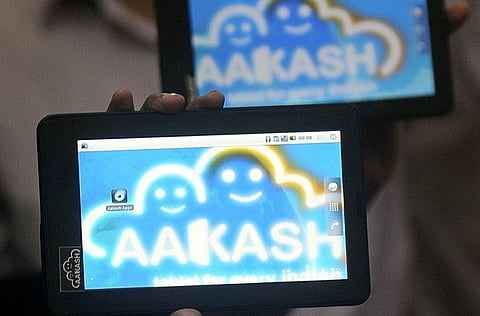India readies upgrade of 'world's cheapest' tablet
First edition was criticised for its quality and distribution

Mumbai: India is set to release an upgrade of its ultra-low-cost computer tablet, the $40 "Aakash-2", after the first edition was criticised for its quality and distribution.
The device was unveiled last year as the "computer for the masses" in India, where millions struggle to fund their education, but as yet the tablet has failed to live up to the hype and reached only a tiny number of colleges.
The Aakash-2 comes with improved features including a longer battery life, a faster processor at 800 Mhz and a better quality touch screen, according to the Indian Institute of Technology (IIT) Bombay which is testing the device.
Distribution of 100,000 new tablets to engineering colleges will begin next month, IIT Bombay spokeswoman Jaya Joshi told AFP on Tuesday.
The device, which has a price tag of Rs2,263, is designed to allow students to interact in video lectures, submit assignments, complete online quizzes and write and run programmes.
"In coming years, Aakash is likely to become a ubiquitous tool in the hands of students, at all levels of their education," said Professor Deepak Phatak, heading up the project, in a release from IIT Bombay.
The original Aakash, dubbed the world's cheapest tablet, was launched in October 2011, but a Right to Information request filed by digital media blog MediaNama showed that only 572 tablets were distributed to just 19 colleges.
The magazine Forbes India also slammed the project this week.
"To put it mildly, the prototype was a disaster. Some phones in the market worked faster than this contraption," it said.
"Similar computing devices with superior capabilities are being brought out of Chinese factories by the thousands. India seems to have lost the plot."
Speaking via video link at a "symbolic launch" of the upgraded device on Monday, India's IT Minister Kapil Sibal said there had been "a sea change in the confidence" of the project since IIT Bombay took over three months ago.
"Unfortunately, there was some delay in taking this project forward for reasons that I don't want to go into now," he said.



